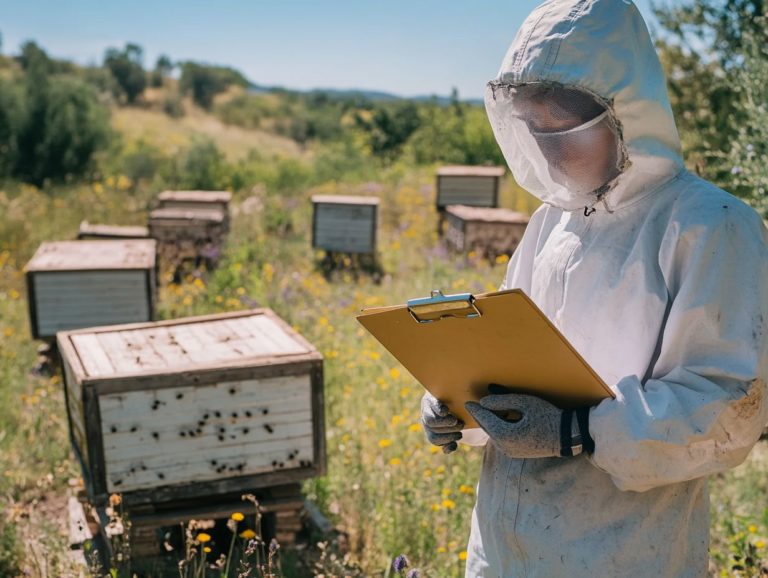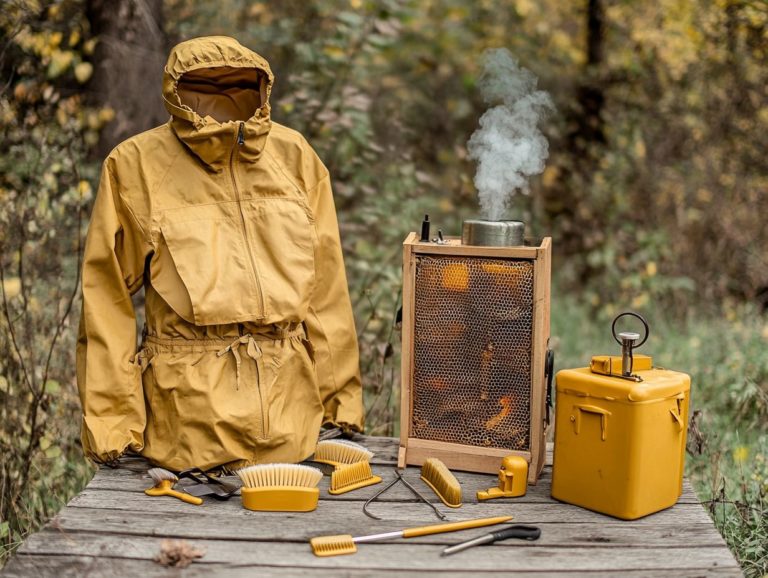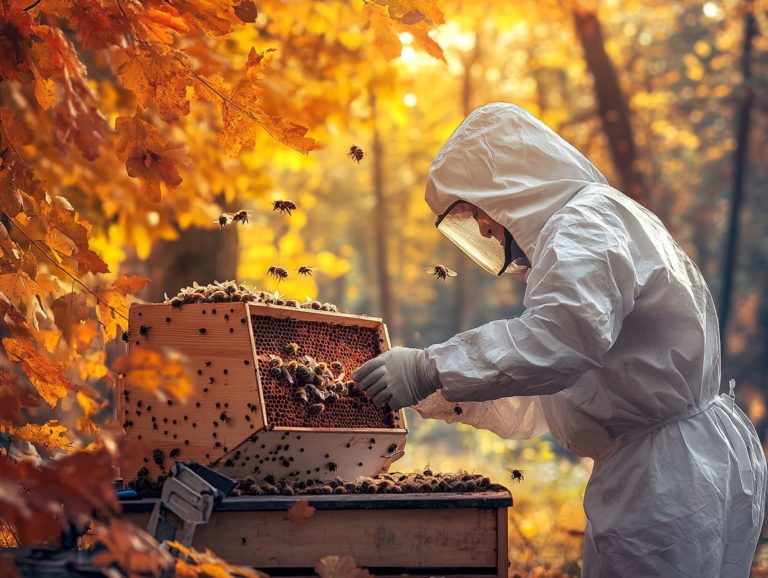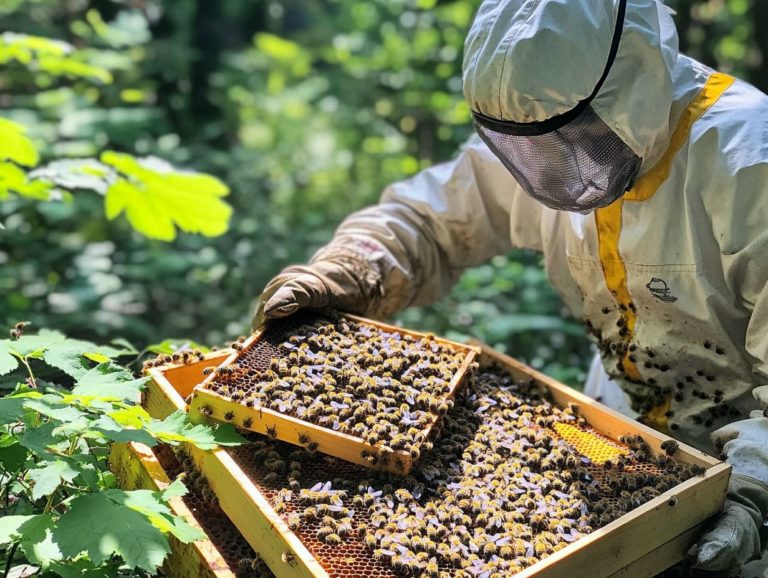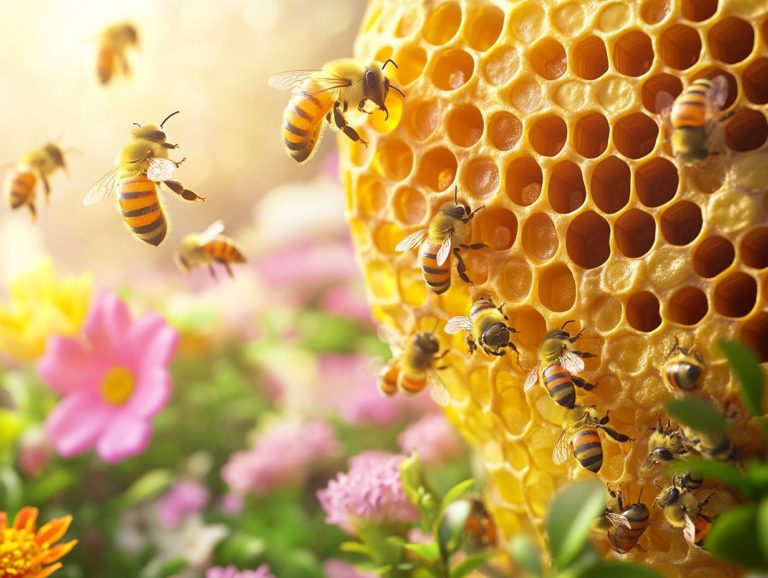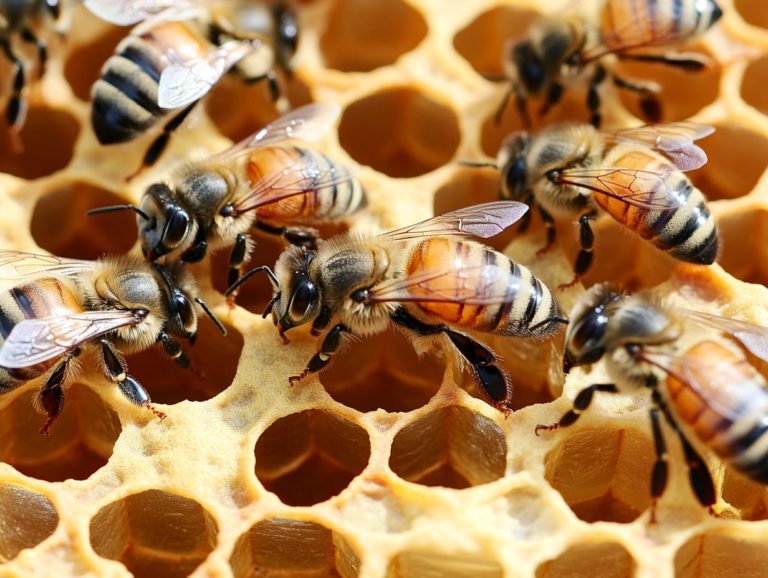The Importance of a Hive Management Mentor
Effective hive management is essential for your success in beekeeping. It ensures that your colonies thrive and that you enjoy a plentiful honey harvest. Key elements include observing bees closely and using a quality beesuit for safety.
Understanding the details of beekeeping can present challenges. This is where having a hive management mentor or enrolling in a beginner’s course can truly transform your experience.
Let s explore why having a mentor is key to successful beekeeping! Mentorship in beekeeping showcases the advantages it brings from acquiring hands-on knowledge and practical skills to steering clear of common pitfalls.
You ll also learn how to identify the right mentor and the qualities to seek. This ensures that your beekeeping journey is not only enjoyable but also richly rewarding. Exploring mentorship alternatives like online options can provide valuable guidance.
Contents
Key Takeaways:
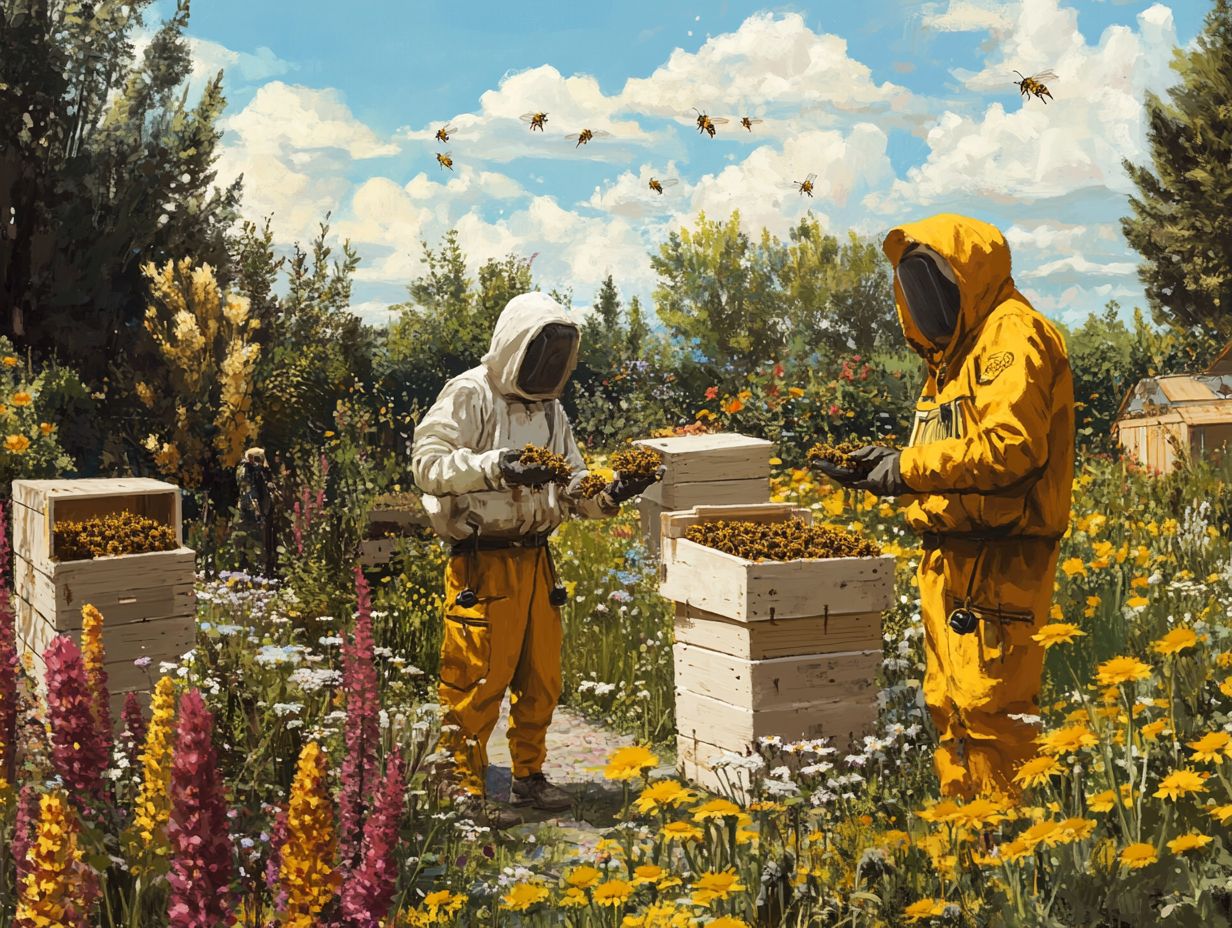
- Don t miss out on the chance to boost your beekeeping success with a mentor! They offer personalized guidance and help you avoid common mistakes.
- When looking for a hive management mentor, consider their experience, knowledge, communication skills, and willingness to teach and share.
- A mentor can assist with specific hive issues like queen rearing, disease management, swarm prevention, bee removal, and harvesting honey, making them an invaluable resource.
Why Is Hive Management Important?
Hive management stands as a cornerstone of successful beekeeping. It incorporates practices and techniques designed to safeguard the health and productivity of bee colonies.
Mastering effective hive management involves grasping essential elements such as colony management, disease control including targeted Varroa treatment, which helps control a common parasite that affects honey bees and thorough winter preparation. Engaging in winter courses can further enhance your skills. These components work together to optimize honey production.
Whether you re a novice or a seasoned beekeeper, understanding these practices can transform your apiary into a thriving hub. This ultimately enhances your honey yields and bolsters a vibrant beekeeping community while promoting sustainable pollinator health.
What Are the Benefits of Having a Hive Management Mentor?
Engaging with a hive management mentor offers a wealth of advantages, especially for new beekeepers eager to elevate their practical knowledge and skills.
Mentorship in beekeeping deepens your grasp of essential concepts like hive management, swarm control, and colony health through personalized instruction and hands-on apiary visits. This tailored guidance helps you cultivate effective communication skills, learn from the experiences of seasoned beekeepers, and avoid common pitfalls. It can also introduce you to hive types and sustainable nuc production techniques.
In doing so, you ll embark on a more enriching beekeeping journey while contributing to a supportive and thriving beekeeping community.
1. Gain Knowledge and Experience
Gaining knowledge and experience through mentorship is one of the most significant advantages for new beekeepers. It grants access to a treasure trove of information and practical skills. Your mentor will likely share their firsthand experiences, helping you grasp the nuances of beekeeping, such as effective hive management, keen observation of bees, and the art of managing small colonies. This relationship deepens your understanding of beekeeping practices and fosters a sense of community, encouraging an enriching exchange of knowledge among peers.
Through guided apiary visits, you ll witness the complexities of bee behavior and hive dynamics firsthand, transforming theoretical lessons into actionable skills. The beekeeping community thrives on collaboration, where both seasoned and novice beekeepers engage in meaningful discussions, troubleshoot challenges, and share valuable tips. Observed events at a training apiary can be particularly enlightening.
You ll also find a variety of educational opportunities, from workshops and conferences to online courses, which will complement your mentorship experience. This ensures you re equipped with the latest techniques and advancements in the field. This holistic approach to learning builds your confidence and cultivates a supportive network to help you thrive in your beekeeping endeavors.
2. Avoid Common Mistakes
One of the key benefits of having a mentor in hive management is the opportunity to sidestep common pitfalls that many new beekeepers often face. Experienced beekeepers offer practical advice and insights that can help you deal with issues like Varroa treatment, which involves managing a common parasite that affects bees, swarm prevention, and maintaining colony health.
This guidance can be invaluable in ensuring that your apiary thrives and that you successfully produce honey. This leads to a more rewarding and fulfilling beekeeping journey.
Mentorship allows you to learn from the experiences of seasoned beekeepers who have weathered the ups and downs of hive management. For example, a mentor might share a story about how a seemingly minor oversight resulted in significant colony loss, highlighting the crucial nature of regular inspections and attentiveness to bee behavior.
By sharing their stories and providing tailored advice, mentors illuminate best practices, enabling you to avoid pitfalls like inadequate foraging opportunities and improper hive placement. They create a supportive learning environment that fosters your confidence and skill, nurturing a deep appreciation for the art of beekeeping. Peer support and understanding communication challenges can further enhance this experience.
3. Receive Personalized Guidance
Personalized guidance is the hallmark of effective mentorship in hive management. This allows you, as a new beekeeper, to receive tailored support that addresses your unique needs and challenges. Through direct interactions and apiary visits, your mentor can assess your understanding of essential concepts like colony management and winter preparation.
They provide real-time feedback and adjustments to your approach. One-on-one attention enhances your learning experience and fosters better communication skills, enabling you to express your concerns and questions more effectively.
This individualized mentorship creates an environment where you can comfortably discuss your experiences and uncertainties. During apiary visits, the hands-on approach allows your mentor to demonstrate techniques and clarify doubts on the spot, making complex topics far more accessible.
This interaction reinforces what you’ve learned and strengthens your bond with your mentor. As you collaborate closely in the field, you gain confidence in your skills while your mentor hones their ability to convey information in a relatable manner, ultimately enriching the entire beekeeping community.
4. Increase Success Rate and Honey Crop
Having a mentor by your side can supercharge your success as a new beekeeper! The presence of a mentor in hive management significantly elevates your success by providing you with the practical skills and knowledge essential for thriving in this rewarding endeavor.
With mentorship, you have the opportunity to learn effective techniques in managing hives, understanding honey bee behaviors, and preparing for winter conditions. All of these contribute to higher honey production and a more bountiful honey crop, as well as healthier colonies.
This boost in success is a game-changer not just for you, but for the entire beekeeping community! For instance, as a novice beekeeper guided by an experienced mentor, you might notice a remarkable improvement in your honey yields thanks to better management of flowering plants and timely interventions against pests or diseases.
Mentors can offer valuable insights on navigating seasonal challenges, including effective Varroa treatment, resulting in fewer colony losses during harsh weather. By embracing effective retention strategies, such as educational workshops and community support networks, the beekeeping community can ensure that newcomers like you not only survive those crucial first few years but also thrive over time.
This ultimately contributes to sustainable practices and enhancing biodiversity.
How to Find a Hive Management Mentor?
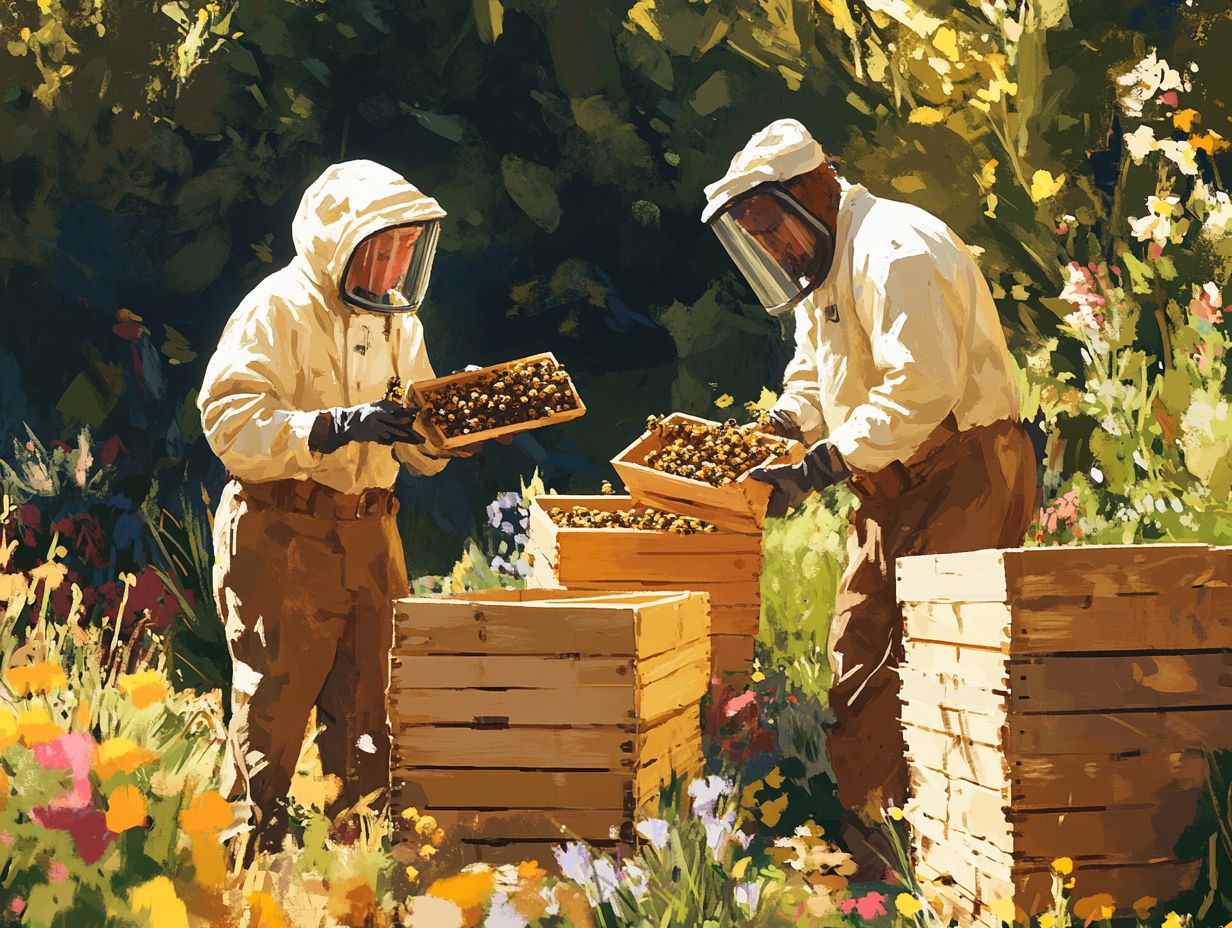
Finding the right hive management mentor is essential for you as a beginner eager to sharpen your beekeeping skills. There are several avenues you can explore to make this connection.
Consider joining local beekeeping associations, attending workshops, and seeking recommendations from seasoned beekeepers. These are all effective strategies to connect with mentors who can provide invaluable insights and practical knowledge.
Additionally, don t underestimate the power of online resources and communities; they can open doors to fruitful mentorship opportunities, ensuring you receive the support necessary to thrive in your beekeeping journey. Engaging with local association meetings and a bee buddy can also provide additional support and guidance.
1. Join Beekeeping Associations
Joining beekeeping associations helps new beekeepers find mentors and truly immerse themselves in the vibrant beekeeping community. These associations often offer lots of helpful resources, networking opportunities, and access to seasoned beekeepers eager to share their wealth of knowledge.
By participating in local events and meetings, you can connect with mentors who resonate with your interests and goals, creating a robust support network that enriches your learning experience. Training strategies and beginner training workshops offered by these associations can be particularly beneficial.
Being part of a beekeeping association not only fosters your personal growth but also encourages friendship and support among fellow enthusiasts. You’ll find yourself participating in workshops, hands-on demonstrations, and local fairs, where you can discover the latest techniques and address challenges in beekeeping.
This community involvement cultivates a genuine spirit of friendship and support, allowing you to ask questions in a welcoming environment and gain practical insights, including swarm control and winter preparation.
These associations frequently organize outreach initiatives aimed at promoting the significance of bees, inspiring you to engage in conservation efforts. This connection enhances your overall appreciation for the craft and deepens your relationship with the environment as you observe bees in their natural habitat.
2. Attend Beekeeping Workshops and Conferences
Beekeeping workshops and conferences are your golden ticket to hands-on skills and mentorship! They are an exceptional way to acquire practical skills, such as colony management, and discover mentorship opportunities within the industry. These events typically feature seasoned beekeepers who generously share their expertise through engaging hands-on training sessions and informative presentations.
By connecting with these professionals, you can build relationships, pose your burning questions, and perhaps even find a mentor who will guide you on your beekeeping journey.
Beyond just practical skills, these gatherings delve into essential topics specifically designed for novices, such as hive management, pest control, and honey extraction techniques. By participating in interactive workshops, such as a beginners course, you’ll not only enrich your knowledge but also forge lasting connections with fellow beekeepers who share your interests and challenges.
Networking at these events can unlock valuable resources, introduce you to local clubs, and even pave the way for future partnerships, such as a mentorship model that offers both online mentorship and in-person guidance.
Jump into these workshops and conferences now to kickstart your beekeeping journey! With so much potential for growth and learning, engaging in these workshops and conferences is crucial for anyone serious about embarking on a beekeeping venture.
3. Ask Local Beekeepers for Recommendations
Seeking recommendations from local beekeepers is a smart choice for anyone stepping into the world of beekeeping. By connecting with those in your area, you can discover mentors who are eager to share their invaluable insights on hive management. This includes aspects like pollen baskets and hive types.
These seasoned beekeepers not only offer guidance but also help you tap into the local beekeeping community. This creates a network that enriches your experience and provides practical advice on managing small colonies.
Building relationships with experienced apiarists can dramatically enhance your learning journey. They provide you with a supportive foundation as you navigate the initial challenges of beekeeping, such as bee removal and sustainable nuc production. Actively reaching out to local beekeeping associations, attending community meetings, and participating in workshops can help you forge vital connections that lead to shared resources and collaborative opportunities.
The advantages of networking extend far beyond just mentorship; it allows you to draw upon a rich pool of shared experience. Together, you can troubleshoot common issues, engage in activities like hive inspections or honey harvests, and contribute to a flourishing local beekeeping culture. Reflecting on experiences by maintaining a reflection journal fosters this sense of community. This not only elevates your own practice but enriches the beekeeping landscape around you.
4. Utilize Online Resources
Utilizing online resources has become an invaluable strategy for new beekeepers seeking mentorship and educational opportunities in hive management. This includes options like a training apiary or beginner training programs.
With the emergence of social media groups, specialized forums, and thorough educational platforms, you have access to a wealth of shared knowledge and collective experiences at your fingertips. These digital venues facilitate instant communication and feedback, nurturing a vibrant community among those who share your passion for apiculture.
One of the standout benefits of virtual mentorship is the flexibility it provides. You can learn at your own pace and revisit complex topics whenever you need to, bridging communication challenges that may arise. This approach can supercharge your in-person learning by offering additional insights and support, ensuring that you, whether a novice or a seasoned beekeeper, have access to essential resources for success.
Don t miss out on the chance to connect with experienced beekeepers online!
What to Look for in a Hive Management Mentor?
When you embark on the search for a hive management mentor, it s essential to keep a close eye on several key qualities that can profoundly influence the effectiveness of your mentoring relationship.
An ideal mentor should bring a wealth of experience in beekeeping, especially in colony management, honey production, and Varroa treatment. They should be equipped to offer invaluable insights, including changes in the types of people getting into beekeeping.
Effective communication skills are equally important, as they enable the mentor to convey complex information with clarity. A genuine willingness to impart knowledge and nurture your growth creates a positive learning atmosphere.
Finding a mentor whose teaching style aligns with your preferences and whose availability suits your schedule can make all the difference in ensuring a fruitful mentorship experience.
1. Experience and Knowledge
When selecting a hive management mentor, consider experience and knowledge as critical factors that will directly shape the quality of guidance you receive. A mentor with a rich background in beekeeping has likely faced a variety of challenges and celebrated numerous successes. This equips them with practical insights into hive management, colony health, and honey production.
This wealth of experience can be a game-changer for beginners like you, allowing you to sidestep common pitfalls and learn effective strategies from someone who has adeptly navigated the details of beekeeping.
For instance, a seasoned beekeeper might share invaluable knowledge about the regional flora that affects nectar flow. This helps you understand when to anticipate honey flows and how to strategize for winterization and winter courses. With their expertise in pests like Varroa mites, you ll quickly learn to spot early signs of infestation and implement preventive measures before issues escalate.
Mentors can also offer wisdom on equipment selection and hive placement, ensuring that you make informed decisions that enhance your chances of successful honey production.
By tapping into a mentor s expertise, you can cultivate a deeper understanding of best practices, such as quality beesuit selection, and foster healthier, more productive colonies.
2. Good Communication Skills
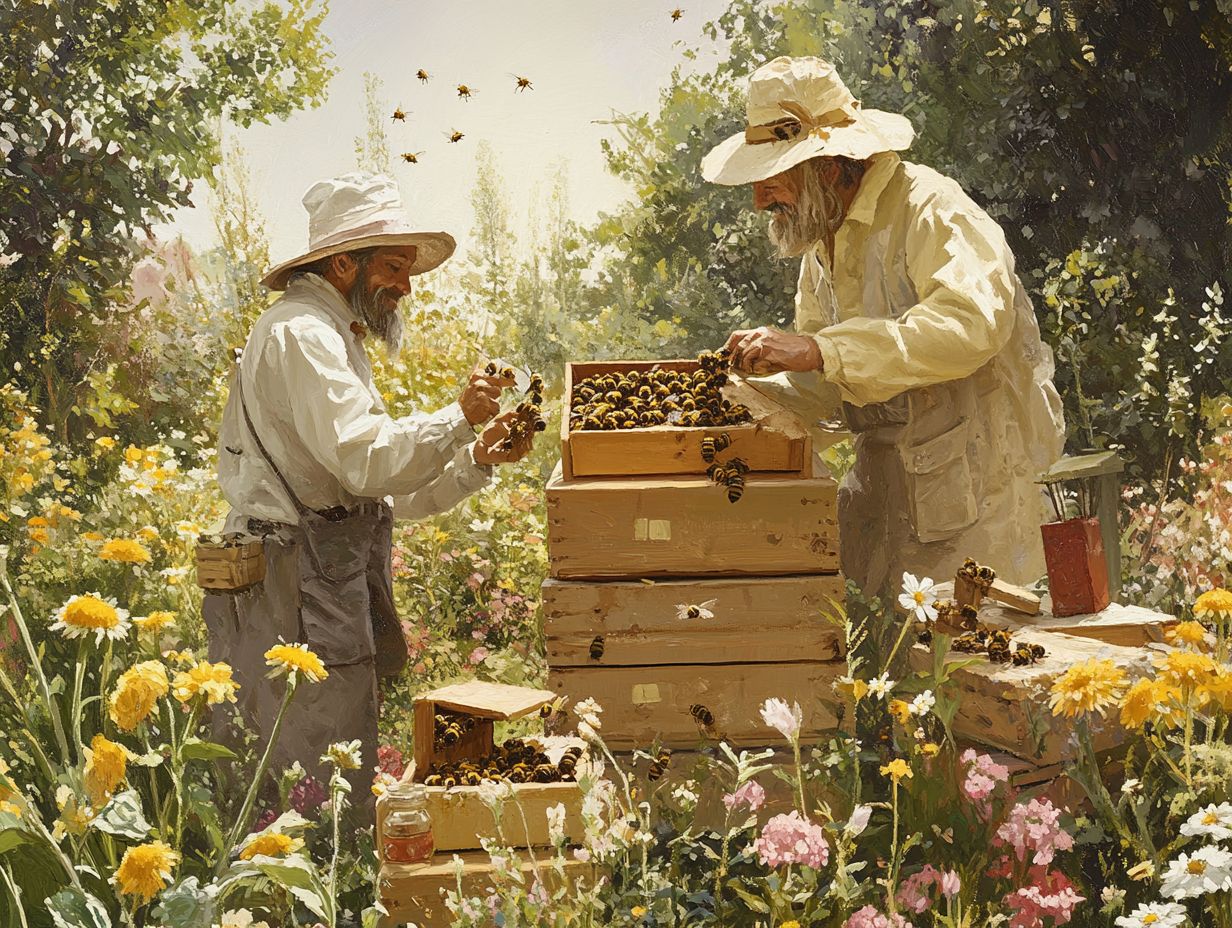
Strong communication skills are essential for you as an effective hive management mentor, as these skills determine how well you convey knowledge and strategies to beginners. Your ability to explain complex concepts clearly and provide constructive feedback during visits to your beehive can greatly enhance the learning experience, offering personal instruction.
Effective communication creates an open dialogue, allowing new beekeepers to voice their concerns and inquiries, which cultivates a more productive mentoring relationship.
Imagine the impact of using visuals like diagrams or videos to show how to inspect a hive. This method makes learning easier and more exciting for everyone!
Sharing personal experiences through storytelling creates a connection that makes lessons more relatable and memorable. Regular check-ins and encouragement for questions not only clarify any doubts but also build confidence in beginners, underscoring the importance of these skills in shaping the next generation of beekeepers.
A mentor s eagerness to share their knowledge is crucial. It creates a supportive environment where you can freely ask questions and dive deeper into beekeeping. When a mentor is passionate about beekeeping and dedicated to your success, they create a lasting impact on your journey and contribute positively to the overall health of the beekeeping community by sharing their beekeeping philosophy.
You can see this positive mentorship dynamic reflected in various examples throughout the beekeeping world, such as those shared by successful beekeepers like Rusty Burlew from Wisconsin and renowned beekeepers in Scotland. For instance, when a mentor takes the time to demonstrate hive inspections, you not only learn the practical skills necessary for effective management but also gain valuable insights into the common challenges that may arise along the way.
This experiential learning is truly invaluable. As mentors share stories of their early mistakes whether it’s grappling with varroa mites or deciphering the intricacies of bee behavior they equip you with the tools needed to navigate similar situations in the future. Ultimately, this sharing of experiences enhances your practical skills while instilling confidence, fostering an environment where you feel enabled to explore and grow in your beekeeping journey.
4. Compatibility and Availability
When searching for a suitable hive management mentor, it’s vital to consider compatibility and availability, as these factors can profoundly influence your mentoring experience. The teaching style of your mentor should resonate with your learning preferences to facilitate effective knowledge transfer and engagement. Their availability for regular interactions be it through apiary visits or online communication is essential for providing the consistent support you need throughout the mentoring relationship, utilizing mentorship alternatives if necessary.
As you seek guidance from seasoned beekeepers, understanding your compatibility on both personal and professional levels will help create a harmonious learning environment. This connection nurtures trust, allowing for open conversations about your challenges and successes. Regular communication skills act as a lifeline, enabling timely feedback and adjustments to your approach in hive management.
Ultimately, the insights offered by your mentor, combined with your adaptability, can cultivate a dynamic partnership. In this collaborative space, both you and your mentor can learn and grow, leading to a successful and enriching mentorship experience. This reflects a well-rounded mentorship model that considers both practical skills and personal growth.
How Can a Hive Management Mentor Help with Specific Hive Issues?
Engaging with a hive management mentor can offer you exceptional support as you navigate the various challenges that often arise for new beekeepers. Whether you’re grappling with swarm prevention and management or tackling disease control, a mentor’s expertise can enable you to craft effective strategies tailored to your specific needs.
Engaging with a hive management mentor can offer you exceptional support as you navigate the various challenges that often arise for new beekeepers. Whether you’re grappling with swarm prevention and management or tackling disease control, a mentor’s expertise can enable you to craft effective strategies tailored to your specific needs.
Moreover, mentors play a crucial role in guiding you through the intricacies of honey harvesting and processing, helping you to adopt best practices that maximize both yield and the health of your colonies. They can also provide practical advice on honey production and processing techniques.
1. Queen Rearing and Replacement
Queen rearing and replacement are pivotal aspects of hive management, and having a mentor can provide invaluable guidance as you embark on your beekeeping journey. Recognizing the right moments to rear a new queen or replace an aging one is crucial for maintaining the strength and health of your colony. A knowledgeable mentor can offer practical insights into selecting the best queen lines, techniques for rearing queens, and effective strategies for introducing them into the colony. This mentorship experience can also include personal instruction and hands-on guidance.
Mastering these skills not only boosts your confidence as a beekeeper but also significantly enhances the vigor and productivity of your hive. Mentors can demonstrate various methods like grafting and using queen cells, shedding light on the critical importance of timing and environmental conditions for these tasks. They ll emphasize the necessity of monitoring colony behavior after introducing the new queen, advising you on gradual integration techniques such as using a queen cage or timing the release to coincide with a nectar flow. Regular apiary visits and hands-on training can help reinforce these practices.
This wealth of knowledge ensures a smooth acceptance of the new queen, fostering a thriving and harmonious colony that is essential for the longevity of your beekeeping pursuits.
2. Disease Management
Disease management is an essential pillar in maintaining the health of your hive. Having a mentor can be invaluable as you navigate this intricate task. They can teach you effective strategies for identifying and treating common ailments, from tackling Varroa mites to keeping an eye out for other diseases. With the insights of experienced mentors, you ll gain a wealth of knowledge on best practices that will keep your colonies thriving and productive. This foundation allows you to adopt a proactive stance towards disease management, ultimately ensuring the longevity of your hives.
Varroa treatment, in particular, is a critical area where mentors can provide practical knowledge and support. Your mentor will guide you in recognizing symptoms linked to diseases like American Foulbrood, which can show up as darkened and sticky brood, and Nosema, often manifesting as dwindling populations and weak colonies. Observing bees carefully and keeping a reflection journal can help track these symptoms effectively.
Through hands-on training and ongoing support, you ll learn how to apply appropriate treatments whether that s giving antibiotics or using essential oils to combat Varroa mites. This expertise sharpens your skills and connects you with a community of passionate beekeepers, encouraging collaboration and the exchange of successful strategies to tackle these ongoing challenges. Engaging with a local association can also provide additional peer support and educational opportunities.
3. Swarm Prevention and Management
Swarm prevention and management represent significant challenges in hive management, and mentorship can be a game changer for you as a new beekeeper. An experienced mentor can impart valuable techniques for monitoring colony behavior, recognizing the signs of swarm preparations, and implementing effective measures to minimize swarming risks. By absorbing your mentor’s practical skills and insights, you can enhance your ability to manage swarms effectively, ensuring the sustainability of your hives.
This is a crucial aspect of sustainable nuc production and general colony management. Your mentor can introduce you to practical tools like swarm traps and guide you on optimal hive placement for maximum visibility and accessibility. They’ll stress the importance of regular hive inspections to catch signs of overcrowding and queen cells early on, as well as teach you how to provide ample space for honey storage and brood rearing. These observed events can offer critical insights for swarm control.
This proactive approach fosters a culture of vigilance, enabling you to anticipate potential issues before they escalate. Frequent communication and shared observations with your mentor will be crucial for mastering effective swarm management and cultivating a thriving beekeeping practice. This mentorship benefits not just your immediate goals but also your long-term retention strategies in beekeeping.
4. Harvesting and Processing Honey
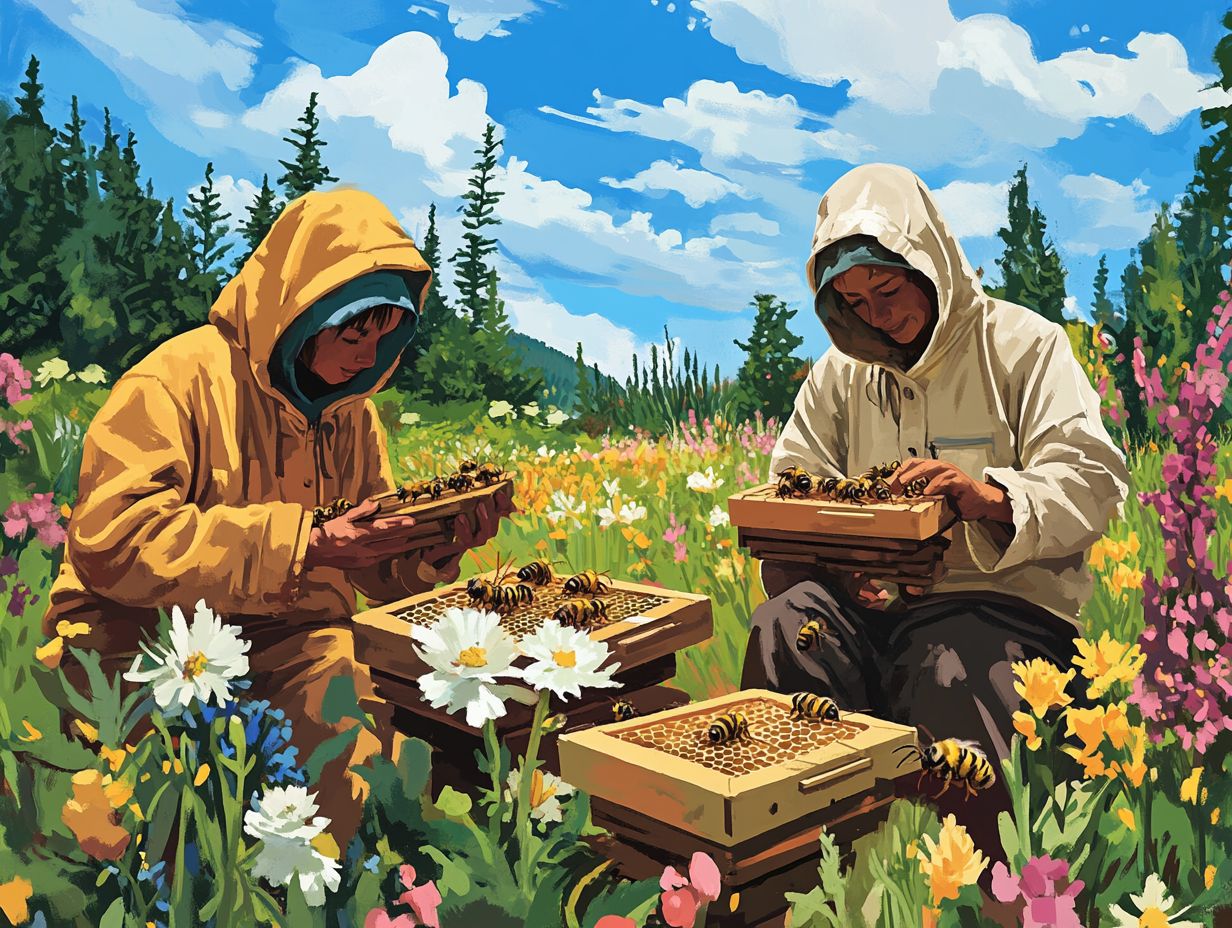
Harvesting and processing honey are among the most rewarding facets of beekeeping, but they demand proper techniques and knowledge. This is where a mentor can be invaluable. With hands-on guidance, a mentor can teach you the best practices for determining the perfect moment to harvest, selecting the right tools, and ensuring that the honey is processed to achieve optimal quality.
This mentorship not only sharpens your practical skills but also builds your confidence as you dive into this gratifying aspect of hive management. Understanding honey crop dynamics and seasonal variations can also be crucial for maximizing your yield.
Timing your harvest is key to unlocking the rich flavors of your honey! It directly influences the flavor and moisture content of your honey. A good mentor will advise you to check the humidity levels and confirm that the bees have capped the honey cells before you even think about extraction. This ensures the honey production process maintains high standards.
Equipping yourself with the right tools, such as a honey extractor and uncapping tools, is crucial for streamlining the process. As you lean on your mentor for advice, you ll learn how to wield these tools safely and effectively, fostering a collaborative learning environment that enriches your entire beekeeping journey. Practical knowledge and hands-on experience are invaluable here.
Take the next step in your beekeeping journey by reaching out to your mentor today!
5. Winterizing Hives
Winterizing your hives is an important part of beekeeping that safeguards the health of your colonies during the harsh winter months. Engaging with a mentor in this endeavor can provide you with invaluable insights as a new beekeeper.
Winter courses or online mentorship programs can be particularly helpful during this critical period. By learning to accurately assess the needs of your colonies, you can implement effective winterization strategies, which may include:
- Wrapping hives to offer extra insulation,
- Monitoring food stores to ensure your bees have sufficient honey or sugar syrup to sustain them,
- Ensuring adequate ventilation to prevent moisture buildup,
- Learning about hive types and their suitability for different environmental conditions.
These practices are essential, as both temperature and humidity play significant roles in hive survival. A mentor s experience can help you dodge common mistakes and thrive as a beekeeper!
They can enable you to adopt best practices tailored to your local environment. This, in turn, will enhance your beekeeping skills and lead to thriving, resilient colonies throughout the winter season.
Participating in a beginners course provides essential knowledge for preparing your hives for winter.
Frequently Asked Questions
What is a hive management mentor?
A hive management mentor is an experienced beekeeper who provides guidance, support, and advice to novice beekeepers on how to properly care for and manage beehives. This can include personal instruction, practical advice, and ongoing support through various stages of beekeeping.
Why is having a hive management mentor important?
Having a hive management mentor is important because they can help prevent common mistakes and ensure the success of your beehives. They can also teach you about bee behavior, colony health, and best practices for harvesting honey.
Mentorship benefits extend to understanding broader beekeeping philosophy and sustainable practices.
How can a hive management mentor help me as a beekeeper?
A hive management mentor can help you by sharing their knowledge and experience, answering any questions you have, and providing hands-on training in hive management techniques. They can also provide emotional support and encouragement during challenging times.
Online mentorship and virtual consultations can also be valuable alternatives for ongoing support.
What qualifications should I look for in a hive management mentor?
When choosing a hive management mentor, look for someone who has at least a few years of experience in beekeeping, a good track record of successful hive management, and a willingness to teach and share their knowledge. Engaging with local beekeeping associations can also help you find well-regarded mentors.
Do I have to pay for a hive management mentor?
It is common for hive management mentors to offer their services for free as a way to give back to the beekeeping community. However, some may charge a fee for their time and expertise.
It is important to discuss this with your potential mentor beforehand. Some mentors may also provide structured mentorship models that include formal training sessions.
How can I find a hive management mentor?
You can find a hive management mentor by joining local beekeeping associations or clubs, attending workshops and conferences, or reaching out to experienced beekeepers in your area. You can also ask for recommendations from fellow beekeepers or do a search online for beekeeping mentorship programs.
Participating in a beginners course or a training apiary can also offer valuable opportunities for mentorship.

